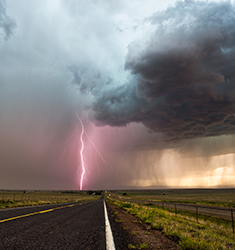Program Description
Geoscience applies the principles of chemistry, physics, mathematics, and biology to understand the composition, structure, and history of the Earth and the processes that govern it. Geoscientists then use this knowledge to study earth systems processes like climate change, plate tectonics, and deep time ecosystems. Geoscientists also address societal needs and problems, such as mineral, energy, and groundwater resources; assessing geologic hazards; and evaluating and remediating environmental contamination. The University of Utah’s Geoscience program will provide you with a broad foundation in fundamental science concepts, and you can then individualize your degree by pursuing one of two emphasis areas in the geoscience field: Geology (which focuses on geologic materials, Earth systems, paleontology, and earth history) or Geophysics (which focuses on using physical methods to image and understand the Earth). Students can also major and emphasize in Environmental Science – Geoscience. After graduation, students are prepared for post-graduate work in the earth sciences, or professional jobs requiring earth science knowledge, such as professional geologists, consultants, or geological engineers in the public and private sector of energy and mineral resources, water resources, emergency management, data science, and planetary science, or as museum professionals, teachers, or professors.
The Student Experience
If you are looking to get involved, consider serving on a department committee or completing an undergraduate research project with a faculty member (GEO3900) or internship with an off-campus organization (GEO5900); there are many opportunities for students to earn credit and receive funding for undergraduate research. Students can also get involved on campus through one of the department’s clubs: the American Association of Petroleum Geologists (AAPG), the Association of Environmental & Engineering Geologists (AEG), and the Society of Economic Geology (SEG) all have chapters at the U, as well as GeoClub and Inclusive Earth.
Career Opportunities
Geoscience students can go on to work for private or public firms or the local, state, or federal government (for example, the USGS, NASA, EPA, DOE, and Department of the Interior). A geoscience education provides a strong basis in observational and predictive physical science. Common careers include professional geologists, consultants, or geological engineers in the public and private sector of energy and mineral resources, water resources, emergency management, data science, and planetary science, or as museum professionals, teachers, or professors. The undergraduate degree also provides a strong foundation for post-graduate education.
More Info
- Department of Geology & Geophysics
- College of Mines & Earth Sciences
- Department Advising
- U Career Success

 Geoscience BS
Geoscience BS


